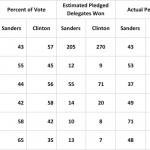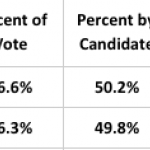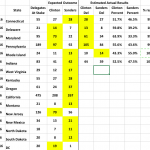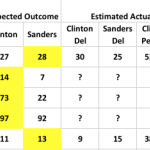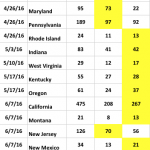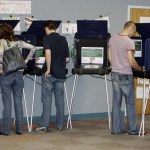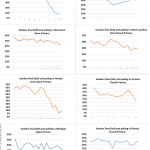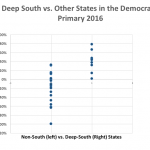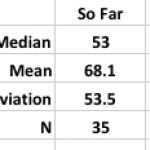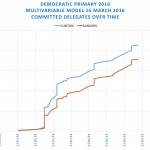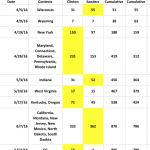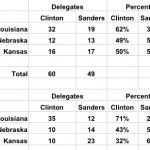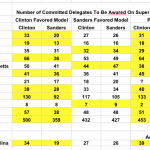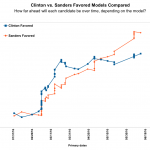Democratic Primary
Since 1968, about 17 candidates ran in Democratic primary races and earned enough votes (above about 20% all told) to count as having been contenders.
Of those, one was murdered, one was shot but lived, one was eliminated from competition by GOP dirty tricks, and one left the race because of insufficient support but would probably have been exposed as having two families (that would have been a scandal) had he stayed in the race.
Putting this another way, there is about a 24% chance that a Democrat running in a primary will be taken out of the race for extrinsic reasons.
Given the stakes…
And, how did my model do?
There was a lot of talk about California, and a lot of back and forth, but in the end I stuck with my original model to predict the outcome of that race. See the table above for the results, but the bottom line is that I predicted that Clinton would get 57 percent of the votes and Sanders 43 percent. It turns out that Clinton got 57 percent and Sanders got 43 percent.
Excuse me for a moment while I bask in the bright light of being-right-ness.
Thank you. Now, on to the details.
First, a quick, note on the numbers and methods. All my percents (for prediction and…
I have not updated my model for predicting primary outcomes in the Democratic contest, but since the last few predictions were very accurate, I don't feel the need to do so. However, I will before the California primary, just in case.
Meanwhile, my model suggests the following for today's primaries.
Kentucky should be nearly a tie, though my model suggests that Sanders will get one more delegate than Clinton (Clinton: 27, Sanders: 28).
The model also suggests that Sanders will win in Oregon, Clinton: 24 and Sanders: 37.
There is very little polling in Kentucky, but the latest poll from…
I'll combine my post predicting the outcome of today's Democratic Primary in West Virginia, and my post giving and discussing the results, here.
My prediction is on this table, on the left side of the line, and the actual results on the right side, for the last several primaries.
Every state is special, and some are more special than others. West Virginia has 29 pledged delegates, but not all of them were assigned today. I assume they will be assigned later. Thus, the slight difference in numbers between what I predicted and what happened.
A key message here is this. Clinton and Sanders…
This is a guest posts by Claire Cohen Cortright.
Claire Cohen Cortright is a mother, climate activist, and biology teacher living in upstate New York. She
is an active member of Citizens Climate Lobby and moderator at Global Warming Fact of the Day.
______________________________________________
It is time, now, for climate activists to get vocal.
As it becomes more clear that Hillary Clinton will be the Democratic Party’s nominee for President, there is increasing talk about the importance of unifying the party. Negotiations are on the horizon … for Vice President and for the Party’s…
Voting is not party involvement.
We hear a lot of talk these days about "voters" being repressed in their attempt to be involved in the Democratic primary process. There may be something to that, and it might be nice to make it easier for people to wake up on some (usually) Tuesday morning and go and vote in a Democratic or Republican primary or visit a caucus. But there is a difference between a desire for a reform and the meaningful understanding of that reform -- why we want it, how to do it, and what it will get us -- that makes it important to do what we Anthropologists sometimes call…
Reports are just coming in, and as if often the case, Trump is already being declared winner in some states. But the Democratic primaries are different ... there are actually two candidates who get delegates instead of just one ... so it takes a little longer to count up the votes.
As a reminder, these are my predictions for today's primaries. I predict a Clinton win in Delaware, Maryland, and Pennsylvania, but a Sanders win in Connecticut and Rhode Island.
However, I have less confidence in these predictions than usual because I think something is happening in the campaign. I think, given…
Between now and the end of the primary season, I expect Sanders to pick up more delegates than Clinton, in total, by a very small margin.
On Tuesday, April 26th, there will be primaries in Connecticut, Delaware, Maryland, Pennsylvania and Rhode Island. That's 384 pledged delegates at stake.
Polls put Clinton ahead in all these states, but not all the polls are current and not all the Clinton leads are strong.
Added Note:
I noticed some very strong reactions in the comments section from people apparently (but not very clearly) accusing me of making up numbers to make it look like Sanders…
We hear a lot about how the system is rigged against Sanders and in favor of Clinton. Such yammering is normal for a political campaign, but if you believe it, I'd love to sell you a nice bridge down near New York City.
There are two things you need to know.
First, the Sanders campaign, according to senior Sanders campaign advisor Ted Devine, does not regard the system as rigged against them. Here's what he said (see below for full video):
I don't think there is. Unlike the Republicans Trump in particular, we are not going around saying everything is rigged. The rules are as the are. We may…
I don't know yet, but as soon as I do, I'll post that below.
With 98.5% of the delegates counted, Clinton won 57.9% of the vote, Sanders 42.1%. This puts Clinton at 139 delegates, very close to my prediction of 137.
Clinton closing in on 57%, or about 140 delegates.
If that holds, this is pretty much of a shellacking for Sanders. Sanders out spent Clinton on ad buys, has campaigned heavily, and has set the expectations as a definitive win. This is Sanders home state (of birth, not representation). Yet he seems to have definitively lost. This will put Sanders even more behind in the…
How does the "southernness" of a state affect the Democratic Primary?
Clinton has been doing well in "The South." Of course, defining what "The South" is is pretty tricky. I divided up the states by "Deep South" vs. Other, so all the usual orginal deep south states count as "southern" except Florida. You know what they say about Florida. "The farther south you go, the farther north you get." Also, Texas is not deep south in the traditional sense.
Using this rough division, Clinton wins all the time in the "Deep South" and Sanders wins some and loses some in the other states, as shown in…
When either candidate wins a state, that candidate's supporters celebrate and underscore the significance of that win. The other candidate's supporters generally proceed to explain how it was not a significant win, or in some cases, come up with conspiracy theories about how the election was stolen.
So, here is an interesting question: Does one candidate or another, between Hillary Clinton and Bernie Sanders, tend to win bigger states more, or smaller states more? This is important because next Tuesday is the New York Primary, and New York is huge. Of course, state size is not the only…
There is some discussion about Bernie Sanders' strategy for winning the nomination despite being significantly behind in the pledged delegate count. Most of this discussion is nearly worthless because those engaged in it (talking and listening) are, or seem, poorly informed about how the system actually works. So I thought this would be a good time to look at some of the numbers.
First, some context.
The primary process is not Constitutionally democratic. There is no legal requirement that a party nominate someone based on any sort of voting process. But, over the last several decades this…
I'll post the results when they are available, after 8 or 9 PM central, below.
Meanwhile, as of 6PM Central time, early info from Wisconsin suggests that Sanders will do very well in today's primary.
The good news for Sanders: My prediction of 55 delegates for Sanders and 31 delegates for Clinton appears to be on track.
Bad news for Sanders: The same model that predicts that still says 2096 committed delegates for Clinton and 1747 for Sanders by the end of the primary season.
The Wyoming primary, this Saturday, should be about even for the two candidates.
In the New York primary, which is…
We are in the Primary Doldrums. For the last several days and the next several days, there is not too much happening, big gaps between the action. Wisconsin is important, and it is Tuesday, Then Wyoming by itself, then New York by itself, then a sort of Super Tuesday with several states.
As you know I've created a multivariable model that has a good record of predicting primary and caucus outcomes in the contests between Hillary Clinton and Bernie Sanders. For the rest of the primary season, this is what it looks like.
I used yellow highlighting to indicate who is expected to win the…
Most polls and FiveThirtyEight predict a Clinton blow-out on Tuesday, with her winning all five states, in some cases by a large margin. My model, however, predicts that each candidate will win a subset of these states, but with Clinton still win the day.
I’ve been working on a model to predict primary outcomes for the Democratic selection process, and generally, the model has proved very effective. After each set of primaries I’ve adjusted the model to try to do a better job of predicting the upcoming contests. The most important adjustment is the one that affects the current model.
The…
Climate Hawks Votes is running a primary in which you can chose either Hillary Clinton, Bernie Sanders, or No Endorsement.
The web page where you can vote is here. You are required to enter some identifying information in order to eliminate or significantly reduced gaming of the poll, so the results should be reasonably fair.
There is a tendency for climate hawks (using the term generally, not in reference to this specific group) to favor Sanders on climate over Clinton, because Clinton is not 100% anti-fracking and anti-methane, while Sanders is. However, I think this is a bit unfair.…
Yesterday, the Democrats held three contests, in Louisiana, Nebraska and Kansas. I had predicted a Sanders win in Nebraska and Kansas, and a Clinton win in Louisiana, using my ever-evolving ethnicity-based projection model. Those predictions came to fruition. Like this:
Predicted on top, Actual on bottom.
Clinton did a bit better than projected in Louisiana, and Sanders did a bit better in Nebraska, but much better in Kansas than predicted.
I had projected the final delegate count to be 60:49 (Clinton:Sanders) for that day, and it turned out to be 55:49 (Clinton:Sanders). The difference…
You may be asking yourself the same question, especially if, like me, you vote on Tuesday, March 1st.
For some of us, a related question is which of the two is likely to win the nomination.
If one of the two is highly likely to win the nomination, then it may be smart to vote for that candidate in order to add to the momentum effect and, frankly, to end the internecine fighting and eating of young within the party sooner. If, however, one of the two is only somewhat likely to win the nomination, and your preference is for the one slightly more likely to lose, then you better vote for the…
I recently developed a model of how the primary race will play out between Democratic presidential hopefuls Hillary Clinton and Bernie Sanders.
That model made certain assumptions, and allowed me to produce two projections (well, many, but I picked two) depending on how each candidate actually fairs with different ethnic groups (White, Back, Hispanic, since those are the groupings typically used).
The two different versions of this model were designed to favor each candidate differently. The Clinton-favored model started with the basic assumption that among white Democratic Party voters,…
